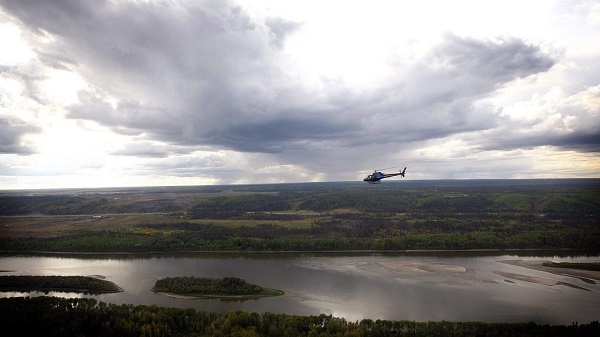Alberta
Provincial Opposition: Why did Kenney’s closest advisor stay at London hotels four times in the last 6 months?

From Alberta’s NDP Caucus
TOP KENNEY AIDE BILLED ALBERTA TAXPAYERS FOR THOUSANDS IN FLIGHTS, MEALS AND FIVE-STAR HOTELS IN THE UNITED KINGDOM
Premier Jason Kenney’s closest adviser has billed Alberta taxpayers for more than $45,000 worth of expenses, including thousands of dollars’ worth of flights, meals and stays in London’s fanciest hotels.
David Knight-Legg, a Yale and Oxford-educated international banker currently earning $195,000 a year as the premier’s Principal Advisor, has expensed three times more than any other member of the Premier’s staff, including the Chief of Staff. Knight-Legg’s expenses after six months are more than Rachel Notley’s Principal Secretary expensed over four years.
Among these expenses are $18,680.77 for four trips to London, each three to four days long, where he stayed either at the five-star Chilworth London Paddington Hotel, or in the upscale Soho neighbourhood at the historic Kettner’s hotel, “home to aristocrats since 1867”, which was opened by Napoleon III’s chef and features an art-nouveau champagne bar. Knight-Legg also billed Alberta taxpayers for Ubers, train rides and 43 meals in Great Britain’s capital.

“What on Earth could this close adviser of the Premier be doing in London?” asked Heather Sweet, Official Opposition Critic for Democracy and Ethics and MLA for Edmonton-Manning. “While the Premier is hiking taxes, cutting funding for schools and hospitals, disbanding firefighting teams and throwing Albertans off the senior’s drug plan amid claims the province is broke, David Knight-Legg was living a life of luxury in London at Alberta taxpayer’s expense.
“We have seen no substantive announcements about policy or collaboration with the United Kingdom. In fact, we can’t find a record of a member of the Kenney cabinet going to London or referencing the trade relationship with the country as a whole. Albertans paid for four luxurious trips in six months. The Premier must immediately release the full, detailed itineraries of each of David Knight-Legg’s trips. Otherwise Albertans have no way of knowing if this former international banker was conducting his own business and making the taxpayer pick up the bill,” Sweet said.
Although the bulk of Knight-Legg’s banking career has been in China and the Pacific Rim, he has yet to travel west of Vancouver on government business. There’s also no evidence that any officials from Economic Development and Trade accompanied Knight-Legg on his trips to London.
Last week, Premier Kenney drew widespread criticism for spending Alberta taxpayers’ money on private aircraft to carry himself, several other conservative premiers and their wives from a pancake party photo-op in Calgary to a meeting in Saskatoon.
“Albertans have a right to know what the purpose of these over-the-top extravagant trips was, and what return – if any – they got for them,” Sweet said. “The premier must apologize for the ongoing pattern of entitlement and frivolous spending of Albertans’ tax dollars in his office.”
Alberta
Alberta’s move to ‘activity-based funding’ will improve health care despite naysayer claims

From the Fraser Institute
After the Smith government recently announced its shift to a new approach for funding hospitals, known as “activity-based funding” (ABF), defenders of the status quo in Alberta were quick to argue ABF will not improve health care in the province. Their claims are simply incorrect. In reality, based on the experiences of other better-performing universal health-care systems, ABF will help reduce wait times for Alberta patients and provide better value-for-money for taxpayers.
First, it’s important to understand Alberta is not breaking new ground with this approach. Other developed countries shifted to the ABF model starting in the early 1990s.
Indeed, after years of paying their hospitals a lump-sum annual budget for surgical care (like Alberta currently), other countries with universal health care recognized this form of payment encouraged hospitals to deliver fewer services by turning each patient into a cost to be minimized. The shift to ABF, which compensates hospitals for the actual services they provide, flips the script—hospitals in these countries now see patients as a source of revenue.
In fact, in many universal health-care countries, these reforms began so long ago that some are now on their second or even third generation of ABF, incorporating further innovations to encourage an even greater focus on quality.
For example, in Sweden in the early 1990s, counties that embraced ABF enjoyed a potential cost savings of 13 per cent over non-reforming counties that stuck with budgets. In Stockholm, one study measured an 11 per cent increase in hospital activity overall alongside a 1 per cent decrease in costs following the introduction of ABF. Moreover, according to the study, ABF did not reduce access for older patients or patients with more complex conditions. In England, the shift to ABF in the early to mid-2000s helped increase hospital activity and reduce the cost of care per patient, also without negatively affecting quality of care.
Multi-national studies on the shift to ABF have repeatedly shown increases in the volume of care provided, reduced costs per admission, and (perhaps most importantly for Albertans) shorter wait times. Studies have also shown ABF may lead to improved quality and access to advanced medical technology for patients.
Clearly, the naysayers who claim that ABF is some sort of new or untested reform, or that Albertans are heading down an unknown path with unmanageable and unexpected risks, are at the very least uninformed.
And what of those theoretical drawbacks?
Some critics claim that ABF may encourage faster discharges of patients to reduce costs. But they fail to note this theoretical drawback also exists under the current system where discharging higher-cost patients earlier can reduce the drain on hospital budgets. And crucially, other countries have implemented policies to prevent these types of theoretical drawbacks under ABF, which can inform Alberta’s approach from the start.
Critics also argue that competition between private clinics, or even between clinics and hospitals, is somehow a bad thing. But all of the developed world’s top performing universal health-care systems, with the best outcomes and shortest wait times, include a blend of both public and private care. No one has done it with the naysayers’ fixation on government provision.
And finally, some critics claim that, under ABF, private clinics will simply focus on less-complex procedures for less-complex patients to achieve greater profit, leaving public hospitals to perform more complex and thus costly surgeries. But in fact, private clinics alleviate pressure on the public system, allowing hospitals to dedicate their sophisticated resources to complex cases. To be sure, the government must ensure that complex procedures—no matter where they are performed—must always receive appropriate levels of funding and similarly that less-complex procedures are also appropriately funded. But again, the vast and lengthy experience with ABF in other universal health-care countries can help inform Alberta’s approach, which could then serve as an example for other provinces.
Alberta’s health-care system simply does not deliver for patients, with its painfully long wait times and poor access to physicians and services—despite its massive price tag. With its planned shift to activity-based funding, the province has embarked on a path to better health care, despite any false claims from the naysayers. Now it’s crucial for the Smith government to learn from the experiences of others and get this critical reform right.
2025 Federal Election
Group that added dozens of names to ballot in Poilievre’s riding plans to do it again

From LifeSiteNews
The ‘Longest Ballot Committee’ is looking to run hundreds of protest candidates against Conservative leader Pierre Poilievre in an upcoming by-election in the Alberta.
A group called the “Longest Ballot Committee” is looking to run hundreds of protest candidates against Conservative Party leader Pierre Poilievre in an upcoming by-election in the Alberta Battle River–Crowfoot riding, just like they did in his former Ottawa-area Carelton riding in last week’s election.
The Longest Ballot Committee is a grassroots group that packs ridings with protest candidates and is looking to place 200 names in the Battle River–Crowfoot riding. The riding was won by Conservative-elect MP Damien Kurek who garnered over 80 percent of the vote, but has since said he is going to vacate his seat to allow Poilievre to run a by-election and reclaim his seat in Parliament in a Conservative-safe area.
In an email to its followers, the committee said “dozens and dozens” of volunteers are ready to sign up as candidates for the yet-to-be-called by-election. The initiative follows after the group did the same thing in Poilievre’s former Carelton riding which he lost last Monday, and which saw voters being given an extremely long ballot with 90 candidates.
The group asked people who want to run to send them their legal name and information by May 12, adding that if about 200 people sign up they will “make a long ballot happen.”
-

 Business2 days ago
Business2 days agoCarney pivots from anti American campaign, embracing US and hailing Trump as “transformational president”
-

 Daily Caller2 days ago
Daily Caller2 days agoMisguided Climate Policies Create ‘Real Energy Emergency’ And Permit China To Dominate US
-

 International1 day ago
International1 day agoIce Surprises – Arctic and Antarctic Ice Sheets Are Stabilizing and Growing
-

 Alberta2 days ago
Alberta2 days agoEnergy projects occupy less than three per cent of Alberta’s oil sands region, report says
-

 Alberta2 days ago
Alberta2 days agoBonnyville RCMP targeted by suspect driving a trackhoe – Update
-

 Energy2 days ago
Energy2 days agoCarney’s energy superpower rhetoric falls flat without policy certainty
-

 Energy2 days ago
Energy2 days agoOil tankers in Vancouver are loading plenty, but they can load even more
-

 2025 Federal Election1 day ago
2025 Federal Election1 day agoGroup that added dozens of names to ballot in Poilievre’s riding plans to do it again







